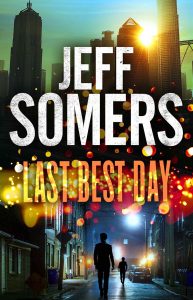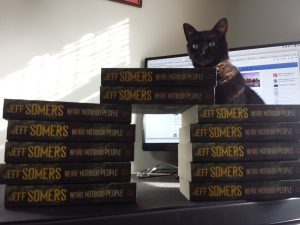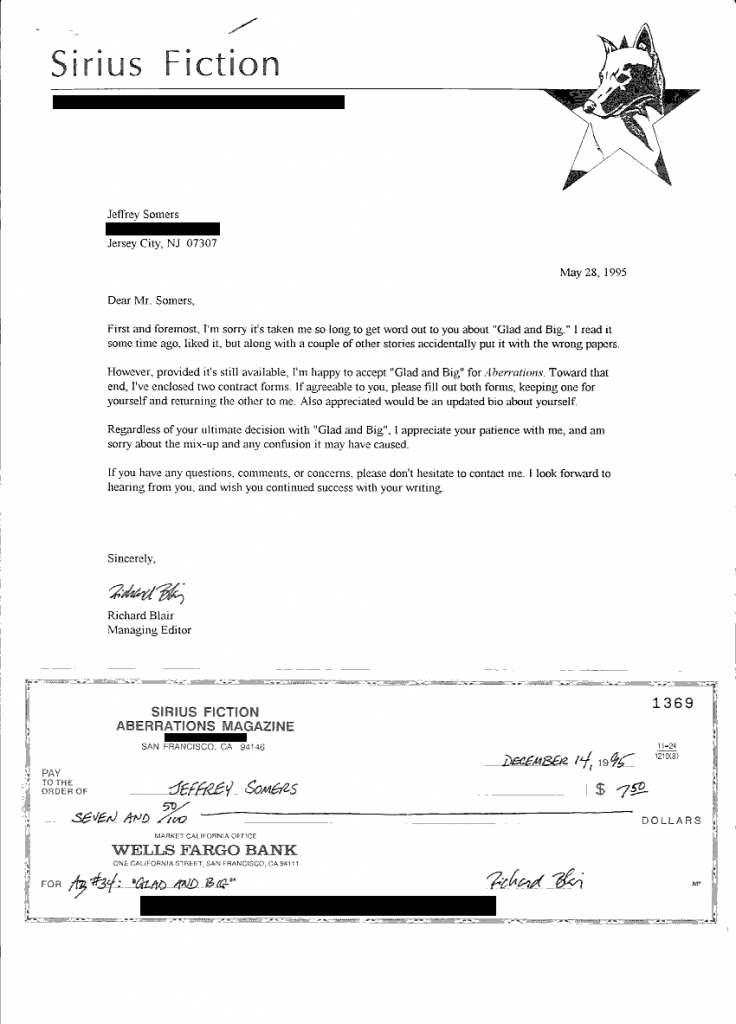Paul stumbled over the curb and caught himself just in time, his briefcase a counterbalance. Without looking up he kept going, hoping to leave behind whatever minor embarrassment there was. He craved coffee. He thought it was almost a palpable sensation, his cells crying out for caffeine and threatening to afflict him with headaches if he didn’t supply it, and soon. He looked up from the steady scroll of sidewalk beneath him and blinked around: it was a bright, sunny day, ice cold and crisp. He could see his usual coffee cart off in the distance, a shiny tin box that gleamed in the squinting sunlight. Glancing at his watch, he calculated the line of four people waiting their turn at the cart and figured he wouldn’t be too much later if he stopped to get a tall cup, instead of choking down the cheap crap they brewed at the office.
Paul had a theory on lateness, one which he had developed over the years through extensive first-hand research. He’d concluded that lateness fell into several defined categories, and that within each category was a lot of wiggle room, so that once you passed from one category into a worse category, it didn’t matter whether you ended up in that category by a hair or a mile. For example, he’d determined that the first stage was actually not even lateness, it was Later On Time, and was basically defined as anywhere up to fifteen minutes past your appointment. If you were supposed to be in by nine in the morning, anywhere from 9:01 to 9:15 was considered Later On Time–that was, not exactly late, but certainly not quite on time. It was a grace period, really. Once the clock on your bosses desk clicked past nine, however, you were in that first category of Later On Time until it clicked past 9:15. Which meant that once you passed nine, you might as well relax and take your time and get there by 9:14 or so–your category wouldn’t improve no matter what you did, then.
He’d refined this theory extensively. 9:16–9:45 he categorized as merely Late; 9:45–10:00 was Very Late, and 10:00–10:30 was Egregiously Late. After 10:30, he turned around and went home and called in sick instead of struggling onward like a beetle tied to a pin. He’d also mapped out all of his standard routes and movements and knew how long it took him to accomplish every task and every leg of his commute. He knew how long it took him to buy a newspaper, depending on which stand he went to. He knew which buses got him where and when, on average. He had memorized the subway schedules and had timed his stride, so he could estimate new times when his usual routes were blocked. This allowed him to determine, with a high level of accuracy, exactly how late he was and how much later any deviation from the norm would make him.
Eyeing the coffee cart a block away, he decided that assuming one more person got on its line before him, it would add four and a half minutes to his walk to work, which would get him there by 9:23. Since not stopping for coffee wouldn’t shave off enough time to lower him from Late to Later On Time, there was no reason not to.
Blinking, he glanced up and shaded his eyes from the sun. It seemed huge, yellow and cold. Certainly, it seemed much larger than usual. But his head was a little fogged with a hangover, and he figured a good cup of coffee would reduce the size of everything in his perception. He walked more purposefully, intent on getting the day going, and thus getting it over with. He had his evening planned out: a dinner of leftovers, a fresh bottle of bourbon for some cocktails, a good movie on television. He wanted to erase days, scrub them off him. His memories of the night before were vague, and the night before that were gone completely. He had a constant sensation of floating bodilessly through time and space, and he liked it that way. It was a form of immortality.
Calm and satisfied, his mind blank, he got on the end of the short line and resigned himself to wait. Some people made chit-chat with the proprietor of the cart, some people just thrust money at him and barked demands. Paul figured it all evened out, time-wise, and didn’t worry overmuch. He calculated that with the volume of pedestrians on the street that morning (heavier than usual) he was probably about ten minutes away from work. Eight if he trotted, but his head didn’t feel like trotting, and so vetoed the concept.
The line moved forward by one, and Paul noted how the shadows on the ground seemed to be moving, circling around them as if clouds were moving rapidly across the sky. Frowning, he glanced up at the sky, shielding his eyes from the light. He froze in place.
From behind him someone said “What the fuck?”
The sun was obscured, he thought at first, by a bunch of black dots. Things flying between him and it, or maybe some weird optical illusion. After a moment of squinting up from under his hand, however, he realized that it was the sun itself.
“Holy shit,” he muttered to himself, backing up to gain a better view. He blinked and looked down, and the world seemed darker, the shadows deeper, the air cooler against his skin. He looked back up, and the dots were spreading, slowly, encompassing the whole of the star.
A woman’s scream pierced his attention, and he whipped his head back to the street around him, and sound came rushing in: screams, shouts, car horns. Chaos, everywhere around him. For a moment he was frozen in place, staring alternately at the sight of the sun going out, one minute piece at a time, and at the darkening world around him, gloom growing around him, fooling his eye and making him imagine that it was thick and edible, impossible to breathe. He didn’t know what to do, where to go. It couldn’t possibly be what he thought it was, that was impossible. And yet, there it was: the sun dimming, right there, turning black like a piece of fruit on high-speed film.
People pushed past him and he let them spin him about. He didn’t understand where they were going, what the point was. If the sun was…if the sun was going out, there was nothing to do. He knew it took light from the sun eight and a half minutes to reach the Earth. Eight and a half minutes after whatever cataclysm was occurring out there in space finished, the last rays of sunlight would touch the Earth’s surface, and everything would be cold and darkness and the irrefutable forces of the universe tearing themselves apart.
Eight and a half minutes. He guessed people were struggling to make it to their loved ones, to seek some sort of safety, maybe just to find out what was going on. But he knew there wasn’t time for any of that, even if radiation wasn’t already ruining radio and television signals, even if the satellites orbiting the Earth had not already been dosed with lethal rays. Even assuming they were not all going to come down with some Andromeda-Strain sunburn from whatever was happening up there, there wouldn’t be time.
He dropped his money on the sidewalk, coffee forgotten, and started to run.
He went against the tide of people because he was running towards his job. The Seventeenth floor in a charmless building with not enough windows and too many walls, and he had never, ever run towards it, even when he was slipping into Egregiously Late.
Most people were running the other way, and he ticked off the seconds that running against the stream was costing him. He looked to his left and dodged diagonally, amazed that no one thought to run in the street despite the fact that traffic had slowed to a crawl, with several accidents already clogging the ways. In the bicycle lane he made better time and adjusted his calculations, but then in the clogged intersection of Flagg and Marble streets someone hit him like a linebacker and knocked him to the street. Before he knew what was happening, hands were on him, pulling at him, and a red face staring down at him.
“What’s going on?” the face demanded. “What’s happening?”
Paul just stared up at the man, speechless. He wanted to say he didn’t know, he wanted to tell the man that no one knew, that if anyone knew they’d have warned the world, but then he thought, maybe not. If he’d known, maybe he wouldn’t have said anything, because it was terrible to think of the world ending like this, in chaos and terror. Better, he thought, that it end in ignorance, with everyone peaceful, and quiet.
The man dropped Paul and ran off, and for another few seconds Paul lay, dazed, and reconsidered again, thinking that maybe a week’s or a day’s warning would have given people the chance to contemplate, to meditate, to consider how they would leave this life. Maybe that would have been best.
Like a stopwatch, the time intruded upon his thoughts, and Paul pushed himself up, recalculating based on his delay. Then he deftly threaded his way through the traffic of people and continued running, his sides burning, his clothes too much now, too hot and scratchy. His building bobbed and weaved ahead, deceptively far away, but Paul ate up the blocks, the press of people thinning blessedly, for some reason. The pounding of his feet became the only sound and rhythm he was aware of, the beat and timing of his life.
The office building was a chaos of people, most of them just standing in the lobby peering out the glass doors at the sun as it rotted right before their eyes. Paul pushed through them and decided to skip the elevators entirely, smashing through the fire doors and bounding up the stairs. His breath burned, his heart was pounding, but in his mind his countdown had reached three minutes, and he knew he didn’t have any time to lose, or to catch his breath. Energy surged through him, crazy, meaningless energy that made him giddy. On the fifth floor, with spots flashing before his eyes in time with his pounding heart, with the dusty air choking him, he found himself shaking with laughter. As he bounded up the landing between the fifth and sixth floors, he let out a choked whoop, a war-cry that echoed off the green walls.
The world was ending, and Paul rushed upwards to meet it’s doom.
Landings swept by, downwards, barely noticed. His vision narrowed to the steps before him, his whole body was slicked with sweat, and gritty from the dust he was kicking up. Ominous creakings and groans floated around him in the dimness, as if the building were about to fall down on him, but he pushed himself further up and further in, laughing painfully the whole way in-between chest-busting gasps for air.
He went past his own floor, kept going up. He’d been a smoker, earlier, and had always hated having to exit the building just to smoke a cigarette, so he’d found his way up to the roof and knew that the door was always easily opened, the lock was old and rusty and snapped open with some gentle coercion. Paul bounded from the stairs in the utter darkness of the service corridor and attacked the door, counting off time in his head. By his estimates, he had thirty seconds. He threw himself against the metal door and heard a satisfying creak, but the door held.
“Come on, you prick,” he panted, backing up and wiping his hands on his pants, ridiculously, before launching himself against the door again. He crashed into it, and it snapped open so violently he sailed through the doorway and crashed onto the roof, tearing up his clothes and hands on the rough surface. Laughing, bleeding, he struggled up onto his knees and looked around.
The weather had turned violently; the wind was roaring and lightning flashed in the nearly-black sky. The sun was being engulfed by the sky, eaten, sucked dry. Rotting, right before him. Below, muffled by the wind, the city was delirious. Paul threw his arms out, unable to explain or even pause to consider the jolly, happy energy that burned through him.
“Come on, then! Come on!” he roared into it, trembling.
The sky disappeared, everything disappeared, and for one incomprehensible moment there was just a sudden freezing cold and the roof beneath him, and his own laughter, and then the frozen blackness reached down and found him.











